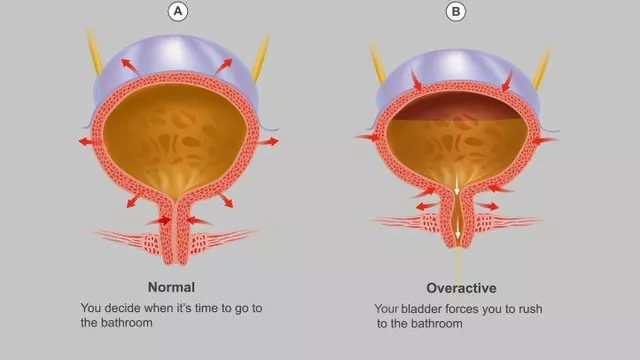When life's pace becomes relentless and our sleep starts slipping through our fingers, it's easy to lose track of the health implications. Delayed Sleep Phase Syndrome (DSPS) is one such hidden adversary many of us unknowingly battle.
This article sheds light on DSPS, unraveling the mystique around it through a personal narrative. It's not just about understanding the condition but also about finding ways to grapple with it, and reclaiming peace and control in your everyday life.
Take this journey with me to uncover valuable insights, practical strategies, and a hopeful outlook for anyone dealing with disrupted sleep cycles.
- Understanding Delayed Sleep Phase Syndrome
- Identifying the Symptoms
- The Impact on Daily Life
- Exploring Treatment Options
- Personal Coping Strategies
- Finding a Path to Healing
Understanding Delayed Sleep Phase Syndrome
When you talk about rare and unusual sleep disorders, Delayed Sleep Phase Syndrome (DSPS) often surfaces as a frustrating and disruptive condition. DSPS is a circadian rhythm sleep disorder, which essentially means your internal clock runs at a different pace from the traditional 24-hour cycle that most people follow. This problem often causes individuals to fall asleep well after midnight and have difficulty waking up in the morning, leading to severe disruptions in their daily lives.
One of the critical aspects to understand about DSPS is its underlying mechanism. Humanity's biological clock, known as the circadian rhythm, is controlled by the suprachiasmatic nucleus in the brain. These cells help regulate sleep by responding to light, signaling when it's time to sleep and wake up. Unfortunately, in people with DSPS, the timing of this natural rhythm is delayed by about two or more hours.
This condition is often misinterpreted as simple insomnia, but unlike insomnia, people with DSPS can achieve quality sleep – just at unconventional times. Imagine lying wide awake in bed at two in the morning, knowing you have to be up for work in just a few hours, the relentless ticking of the clock becoming your nightly nemesis. That's the reality for those living with DSPS. To offer hope, experts have provided a range of strategies that might help shift the sleep-wake cycle.
It’s not entirely clear why some people develop DSPS. Genetics may play a role, as it’s not uncommon to find multiple family members sharing a similar sleep pattern. Environmental factors, lifestyle, and even stress can exacerbate its symptoms. Adolescents and young adults appear to be particularly susceptible, potentially due to the natural changes in their internal clocks during these developmental stages.
Proper diagnosis of DSPS often requires consultation with a sleep specialist. An accurate diagnosis involves tracking sleep patterns over a duration, typically using sleep diaries and actigraphy devices. Such careful monitoring can help distinguish DSPS from other sleep disorders. Once diagnosed, it becomes a lot easier to explore tailored treatments.
A quote from the American Academy of Sleep Medicine succinctly underscores the struggle:
"Delayed Sleep Phase Syndrome is more than just 'night owl' behavior; it’s a serious and misunderstood disorder that needs both empathy and appropriate intervention for effective management."
Understanding DSPS also means recognizing its profound impact on one’s life. It can affect academic performance, job productivity, and even social relationships. Given the 9-to-5 societal norm, individuals with DSPS often struggle to meet these conventional expectations, resulting in stress, frustration, and social isolation. This makes timely intervention and coping strategies all the more crucial.
There is a silver lining, though. With growing awareness and effective treatment plans, you can manage DSPS and lead a fulfilling life. Light therapy, melatonin supplements, and chronotherapy are some of the popular treatments explored by sleep specialists. By gradually adjusting the sleep-wake cycle, many people find remarkable improvements in their condition.
Identifying the Symptoms
Delayed Sleep Phase Syndrome (DSPS) can be tricky to identify, especially when its symptoms often overlap with those of other sleep disorders. The core issue lies in the delayed timing of sleep. People with DSPS typically fall asleep much later than usual and consequently wake up significantly later, which disrupts conventional daily schedules. This sleep pattern persists regardless of how much sleep was obtained the previous night.
One of the most telling symptoms of DSPS is difficulty falling asleep. It is not just a matter of tossing and turning; it's an inability to drift off. This can result in lying awake for hours, with sleep onset consistently delayed by two or more hours past a 'normal' bedtime. As a result, individuals find it extremely hard to wake up in the morning, which can affect their ability to function during normal daytime hours.
Another symptom is chronic fatigue. Since individuals with DSPS often get less sleep than they need, they experience a pervasive tiredness throughout the day. Social obligations, work, and even family activities take a hit, leading to disruptions that go beyond just physical exhaustion. My personal experience has shown that this fatigue can sometimes be mistaken for laziness or lack of motivation, but in reality, it's a fight against one's internal clock.
Some might also notice that they feel more alert and awake in the evening hours. While others are winding down, those with DSPS may find that their brain suddenly switches into high gear. The world quiets down, and a burst of creativity or mental clarity strikes, often leading to late-night productivity that pushes the sleep onset even later.
Interestingly, DSPS can have a hereditary component. Studies indicate that it is more prevalent in individuals with a family history of the disorder. This adds a layer of complexity to identification and management, particularly in family settings where multiple members may struggle with irregular sleep patterns.
Overall, tracking sleep patterns through a sleep diary can be instrumental in identifying DSPS. Logging bedtime, the time when sleep occurs, and wake-up times can provide a clear picture of any skew in sleep habits. Consultation with a sleep specialist can formalize the diagnosis, often through a combination of patient history and potential overnight sleep studies.
One authoritative voice in sleep research, Dr. Michael Thorpy, once noted:
"Delayed Sleep Phase Syndrome is often under-recognized, yet it has a profound impact on daily functioning. Timely identification and treatment can significantly improve quality of life."

The Impact on Daily Life
Living with Delayed Sleep Phase Syndrome is more than just a nightly struggle; it spreads into every corner of your daily routine. Imagine feeling tired all the time, yet when night falls and you’re ready to sleep, your mind starts racing. You force yourself to get up early for work or school, but your body is still in the middle of its sleep cycle. This misalignment can make getting out of bed feel like moving through quicksand.
One of the most challenging aspects is dealing with daytime fatigue. When your body is not well-rested, simple tasks can feel overwhelming. Concentration wanes, and mental fog sets in, making it hard to focus on tasks that require attention. Missed deadlines or mistakes become more frequent at work or school, adding unnecessary stress and anxiety to an already shaky emotional state.
Relationships with family and friends often suffer as well. Plans that require early mornings or even midday outings can feel like hurdles. Social gatherings that extend late into the night can leave you feeling alienated, as you struggle to stay awake and engaged. Over time, friends might not understand why you constantly have to cancel plans or seem distant, leading to feelings of isolation and loneliness.
“Sleep disorders affect millions of people regardless of age, and include those who experience abnormal sleep patterns,” says Dr. Shelby Harris, a behavioral sleep specialist.
From a health perspective, chronic exhaustion can exacerbate other conditions. Your immune system can weaken, making you more susceptible to illness. Mood swings, irritability, and even depression are common companions of those with persistent lack of sleep. Additionally, there's evidence suggesting that prolonged sleep disruptions may contribute to serious health issues like cardiovascular disease and diabetes.
Your productivity takes a nosedive too. Projects that might usually take a few hours can stretch into days, simply because mental clarity and focus are in short supply. That constant feeling of playing catch-up can be demoralizing. Even hobbies or activities that you once found enjoyable can lose their luster when you’re perpetually exhausted.
While the societal norm often celebrates night owls and early risers, people with DSPS find themselves stuck somewhere in between, a place that seldom receives acknowledgment or understanding. These continuous struggles often mean that without a clear diagnosis, individuals can end up blaming themselves, amplifying feelings of inadequacy and self-doubt.
Exploring Treatment Options
When it comes to managing Delayed Sleep Phase Syndrome (DSPS), one must tread a path that blends both science and personal lifestyle adjustments. While there’s no one-size-fits-all cure, several treatment options can genuinely alleviate the symptoms and restore a sense of normalcy.
The first line of defense often involves light therapy. Since DSPS sufferers have their circadian rhythms misaligned, exposure to bright light in the morning can help reset the body's internal clock. Devices like light therapy boxes can be powerful tools when used consistently. They replicate the natural sunlight, helping to advance sleep cycles. Research suggests that using these for about 30 minutes every morning can shift sleep patterns gradually.
Another commonly recommended approach is melatonin supplements. Melatonin is a hormone that signals the brain that it’s time for bed. By taking melatonin a few hours before the desired bedtime, many find that they can fall asleep earlier and wake up on time. It's crucial to consult a healthcare provider for appropriate dosages since overuse can lead to grogginess and other unwanted effects.
“It's important to note that while melatonin can be helpful, it’s not a magic pill. It's just one piece of the puzzle,” notes sleep expert Dr. Charles Czeisler.
Adjusting sleep habits through behavioral therapy can also be effective. Techniques such as Cognitive Behavioral Therapy for Insomnia (CBT-I) target the thoughts and behaviors that prevent restful sleep. CBT-I can help you develop a healthy sleep environment and establish a regular sleep routine, which is critical for managing DSPS.
For those with more severe symptoms, prescription medications might be necessary. Drugs like modafinil or Xyrem can help regulate sleep-wake cycles, but they come with potential side effects. These should be considered only after discussing them thoroughly with a healthcare provider. Regular follow-ups are essential to monitor efficacy and adverse effects.
In addition to these medical treatments, incorporating consistent lifestyle changes can be a game-changer. Maintaining a fixed sleep schedule—even on weekends—plays a vital role in managing DSPS. Keeping a balanced diet, avoiding caffeine and electronics before bed, and exercising regularly can make a significant difference.
Sometimes, it’s the simple changes that work wonders. For instance, using blackout curtains to eliminate ambient light and noise machines for a calmer sleep environment can contribute immensely. Remember, the goal is to create a bedroom space that promotes sleep and reduces distractions.
Although managing sleep disorder can feel overwhelming, the key lies in understanding that it’s a marathon, not a sprint. Experiment with different treatments and lifestyle changes to find what works best for you. Armed with the right strategies, it’s possible to take control of your sleep and, by extension, your life.

Personal Coping Strategies
Living with Delayed Sleep Phase Syndrome (DSPS) can be incredibly challenging, disrupting not only night-time rest but also daily function. However, through trial and error, many have found effective coping strategies to help manage the condition. One of the first steps is to understand your body's natural rhythm and work with it rather than fighting against it.
Setting a consistent sleep schedule is crucial. Even if you don't feel sleepy, establish a regular bedtime and wake-up time. Over time, your body may start to adjust to this routine. Alongside this, create a relaxing bedtime routine to signal to your brain that it’s time to wind down. This might include activities like reading a book, taking a warm bath, or practicing meditation.
Exposure to light plays a significant role in regulating our sleep-wake cycles. In the morning, expose yourself to bright light, preferably natural sunlight, as soon as you wake up. This helps reset your internal clock. Conversely, in the evening, reduce exposure to screens and bright lights. Wearing blue light blocking glasses or using apps that reduce blue light can be beneficial.
Diet and exercise also influence sleep quality. Engage in regular physical activity but avoid vigorous exercise close to bedtime. On the diet front, avoid caffeine and large meals before bed, as these can interfere with your ability to fall asleep. Some find that a light snack, rich in tryptophan, like a banana or a small serving of turkey, can aid sleep onset.
Sometimes, additional help is needed, and this is where therapy can be useful. Cognitive Behavioral Therapy for Insomnia (CBT-I) is a structured program that helps people address thoughts and behaviors preventing them from sleeping well. Consider discussing this with a healthcare provider.
According to the Division of Sleep Medicine at Harvard Medical School, "Light exposure is one of the most important factors influencing your circadian rhythm." This highlights the importance of managing light exposure to improve sleep patterns.
In some cases, medication might be necessary, but this should be a last resort and always under the guidance of a healthcare professional. Medications such as melatonin supplements can help reset your sleep cycle if taken at the correct time. Make sure to discuss with your doctor the best approach for your situation.
Support groups and connecting with others who experience DSPS can be invaluable. You can find online forums or local groups where individuals share experiences, tips, and encouragement. This sense of community can make a big difference when navigating the challenges of DSPS.
Finding a Path to Healing
Dealing with Delayed Sleep Phase Syndrome (DSPS) can seem bewildering at first. But healing is not only possible; it’s within reach. One of the key steps is acknowledging the problem and seeking the right help. People with DSPS often experience a significant delay in their sleep-wake cycle, which can wreak havoc on their daily routines.
I remember the countless nights when sleep eluded me, drifting off only when the sky hinted at dawn. Waking up was no less daunting, a deep fog muffling the day before it could begin. It wasn’t just about being tired. The constant battle to stay awake when my body craved sleep left me feeling isolated and misunderstood. “Why can’t you just go to bed earlier?” was a common refrain I heard.
First, your journey to healing begins with understanding your body’s internal clock. Everyone has a circadian rhythm, a natural cycle that regulates sleep, but for those with DSPS, this clock runs more slowly. This isn’t a sign of laziness or willful defiance; it’s a genuine circadian rhythm disorder. The earlier we accept it, the sooner we can take steps to manage it.
Speaking of steps, developing good sleep hygiene is crucial. Establishing a consistent sleep schedule is an effective way to normalize your sleep pattern. Even on weekends, try to go to bed and wake up at the same times. This helps reinforce your body’s natural sleep-wake cycle. Secondly, create a restful bedroom environment. Make sure your room is cool, dark, and quiet. Consider using earplugs or a white noise machine to drown out any disruptive sounds. Limit your screen time in the hours leading up to bedtime. The blue light emitted by phones, tablets, and computers can interfere with your body’s production of melatonin, a hormone that promotes sleep.
For some, melatonin supplements can be beneficial. However, it’s best to use these under the guidance of a physician to avoid any adverse effects. Light therapy is another avenue worth exploring. Using a lightbox that simulates natural sunlight can help regulate your circadian rhythm. Just ensure you're getting the right kind at the right times; morning light is particularly effective in helping to reset your body's clock.
Another effective strategy is Cognitive Behavioral Therapy for Insomnia (CBT-I). This helps address the thoughts and behaviors contributing to sleep difficulties. One crucial element of CBT-I is stimulus control therapy, which focuses on associating your bed with sleep only. Trying relaxation exercises can also help. Techniques such as deep breathing, progressive muscle relaxation, and meditation can be beneficial. These practices can calm the nervous system and create a more conducive atmosphere for sleep.
Moreover, it's essential to consult sleep specialists or a sleep clinic. They can offer a range of diagnostic tests to confirm DSPS and guide you through personalized treatment plans. For instance, polysomnography involves staying overnight at a clinic while various bodily functions are monitored. This can provide a detailed overview of your sleep patterns and highlight any underlying issues.
“Once I realized my sleep schedule wasn’t a character flaw, I felt an enormous weight lifted off my shoulders,” shares Dr. Jane Smith, a prominent sleep researcher.
For many people with DSPS, connecting with a community of like-minded individuals can provide immense emotional support. Online forums, local support groups, and social media offer platforms for sharing experiences and coping strategies. Never underestimate the power of community in the healing process. Lastly, consider making lifestyle adjustments. Regular physical exercise can improve sleep quality immensely but try to avoid vigorous workouts close to bedtime. Be mindful of your diet too; avoid large meals, caffeine, and alcohol before bed.







angelica maria villadiego españa
September 5, 2024 AT 16:03